| Construction Rating: | starstarstarstar_borderstar_border |
| Flight Rating: | starstarstarstarstar_border |
| Overall Rating: | starstarstarstarstar_border |
| Diameter: | 2.20 inches |
| Length: | 41.00 inches |
| Manufacturer: | Empire Rockets |
| Skill Level: | 4 |
| Style: | Scale |

Brief:
A fairly well detailed scale model, though designed to fly only as a single
stage. A good project for the experienced builder (rated as a skill level 4
kit).
Construction:
Before hitting the parts list, I've got to toss in a decent word about customer
service. I've heard mixed reviews by word of mouth and on other forums about
Empire Rockets aka Vin125 on eBay.
Personally, I had trouble finding a couple of kits on the website that I
wanted, so I emailed for a quote request. Vin took a few weeks to get back to
me (due to health problems) and I in turn took a couple of months to place the
order. Once it was placed though, I got the kits reasonably quickly and in fine
shape. I then buried them in my build queue for about 2 months. Later, I
discovered my wife's cat sleeping in my box o' kits. After shooing the cat away
(I figured inserting a G80 into the feline fanny wouldn't go over well) and
installing a door to the storage room, I found that both of the body tubes in
this kit were crushed. I then dropped Vin a request for quote on replacement
tubes plus another kit or two I was interested in. Being a cat lover, he
offered to replace the tubes for free. The replacement tubes promptly arrived
with my order for more kits. I have had no problems with Empire Rockets
whatsoever and would rate them well above the cat in the scheme of things.
OK, now the parts list (the kit didn't include one, but the following are the main components):
- BT-70 lower body tube (white glassine)
- BT-55 upper body tube (white glassine)
- PNC55 (Estes style) nose cone
- 24mm motor tube/plywood centering rings
- Custom turned balsa transition**
- Balsa fin stock
- 18" rugged plastic chute (made from the stuff used for cheap tablecloths)
- 1/4" round elastic shock cord
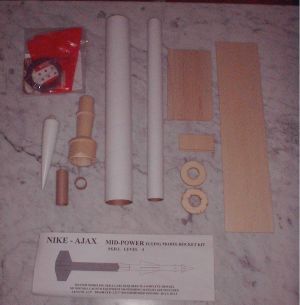
** - many of the eBay auctions boast of using 600 grit sandpaper while on the lathe so no sanding is necessary. My transition was extremely rough and was tricky to sand down with 240 grit. Aside from the ugly finish, it was well turned and all other components were very good quality.
The instructions are generally good for this kit, although they are clearly for the experienced builder. With what few illustrations there are, they are buried in the back. There are also a couple of minor typos in instructions. Still, I did not have any trouble working through the construction on this.
Motor tube assembly is basic: a 24mm tube, engine block (CR18-24 ring), and a couple of plywood centering rings. I was a bit surprised no hook was included in this kit but tape retention works fine too. Generally, if using a fixed length motor (with an engine block), I prefer to use a metal hook. If I want to allow varying motor lengths (this kit is designed for Ds, but could probably handle Es with no problems), I avoid the block and the hook.
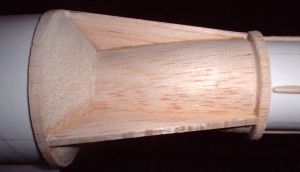 The
instructions are a bit vague in directing one centering ring glued 1" from
"one end". This should be more specifically the aft end, which is
especially important since just prior to this we are instructed to glue in the
motor block.
The
instructions are a bit vague in directing one centering ring glued 1" from
"one end". This should be more specifically the aft end, which is
especially important since just prior to this we are instructed to glue in the
motor block.
Next up is cutting fins from sheet stock. Lots of fins on this one and that means lots of cutting and sanding. There are 3 lower fins, 8 upper fins, 4 fins that go on the nose cone, and 3 fins custom fit to the transition section. There's also extra stock for cutting conduits and standoffs for the launch lugs. Most fins get a beveled edge sanded on the leading and trailing edges. I found the template for the custom fins mounted to the balsa transition were not very close to fitting my transition. They were very oversized and I wound up drawing a template by hand rather than sand down all the excess. The result was an excellent fit, which looks almost like a solid balsa transition, carved from a block of wood.
Booster assembly starts with insertion of the motor mount. The instructions call for this to be recessed by 1.65", although the illustration in the back shows this to be 1.0". I went with 1.0" for a flush mount. I then tacked on the fins and lugs with CA, followed up by glue fillets.
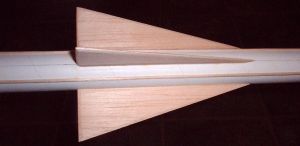 The upper
body section gets 8 fins and 4 conduits (made from 1/16" x 17" strips
of balsa sanded round lengthwise). Since the deployment is intended to go out
the nose/upper body seam, the upper and lower body tubes are each glued to the
balsa transition. It should be fairly obvious and there's a nice bold warning
in the text, but it is still a good idea to check the alignment of the upper
4-fin lines versus the lower 3-fin lines, making sure launch lugs are not
blocked. Also note that the launch lug is 1/8", which is a bit optimistic
for a 24mm motor. I'd suggest upgrading to 3/16" if you've got spares,
even though I did not happen to personally experience any rod whip.
The upper
body section gets 8 fins and 4 conduits (made from 1/16" x 17" strips
of balsa sanded round lengthwise). Since the deployment is intended to go out
the nose/upper body seam, the upper and lower body tubes are each glued to the
balsa transition. It should be fairly obvious and there's a nice bold warning
in the text, but it is still a good idea to check the alignment of the upper
4-fin lines versus the lower 3-fin lines, making sure launch lugs are not
blocked. Also note that the launch lug is 1/8", which is a bit optimistic
for a 24mm motor. I'd suggest upgrading to 3/16" if you've got spares,
even though I did not happen to personally experience any rod whip.
The shock cord (round elastic) is anchored to a screw eye at the forward end of the transition and then runs all the way up the body tube. Using hindsight, one improvement I would definitely suggest is adding a length of 120 pound or heavier Kevlar® anchored to the transition, then attaching the elastic to the Kevlar®. I'm probably the only one this happens to, but I find the ejection charges from a D occasionally carry more kick than the motor itself and I'd feel better with Kevlar® down there.
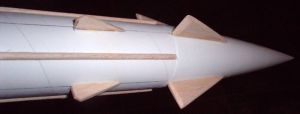 As
mentioned earlier, the PNC55 nose cone also gets 4 small fins bonded to it.
This is a bit challenging for a couple of reasons. First, it's hard to mark an
aft baseline to align the ends of the fins. Second, the cone has a slightly
curved taper, and the root edge of the fin is flat. I taped some sandpaper to
the cone, and used it as a sanding block to put a small contour on the fins,
which provided a better fit.
As
mentioned earlier, the PNC55 nose cone also gets 4 small fins bonded to it.
This is a bit challenging for a couple of reasons. First, it's hard to mark an
aft baseline to align the ends of the fins. Second, the cone has a slightly
curved taper, and the root edge of the fin is flat. I taped some sandpaper to
the cone, and used it as a sanding block to put a small contour on the fins,
which provided a better fit.
Finishing:
The instructions offer a couple of suggested paint schemes, either all white or
olive drab booster and white sustainer. The header card (black and white) shows
a colored booster and the illustration at the back of the instructions shows a
colored booster with different trim (one has painted fins, one has white). I
googled for pics of the real thing and found no less than 4 different color
schemes. I wound up choosing one of the simplest schemes: olive drab base and
white upper. The transition was also olive, as were the booster fins. This
didn't quite match any of the illustrations or examples.
No decals were supplied with this kit although a basic "US Army" waterslide would make it more representative of a scale rocket (and no doubt raise the kit price).
Construction Rating: 3 out of 5
Flight:
The D12 is the only recommended motor, either a 3 or 5 second delay. For my
first flight, I chose a 3 second delay on a nearly perfect day (3-5 mph winds
in Ohio during winter is the best I could expect).
The rocket flew straight as an arrow but for some reason started to spin a bit near the top of the flight, which might indicate a loose transition fit. I had used a 3 second delay, which was a bit early as it was still coasting up albeit pretty slowly.
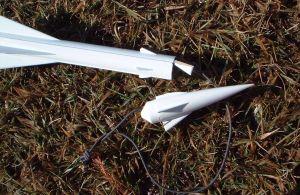
Recovery:
Very nice flight to about 400-500 feet. I should definitely upgrade the shock
cord though. The chute was impressive--nearly ripstop nylon quality. Deployment
was fine and the bright red 18" chute was certainly easy to pick up on the
way down.
Upon retrieving, I discovered a bizarre variation of the "balsa smile"--the whip back from the shock cord caused the nose cone to hit the body tube. The nose cone is plastic (making it fairly dent proof) and just happened to hit at an angle, breaking off one of the fins on the nose cone. The fin actually wedged itself in between layers of paper in the upper body tube. It didn't damage the tube and wound up being an easy repair. Still, the shock cord is definitely too short and I will be adding at least 2-3 feet of extension before flying again.
Flight Rating: 4 out of 5
Summary:
Overall, I found this to be a pretty good kit for the money. The balsa
transition and custom fit fins are very sharp (even though that rough finish
was pretty nasty). With a couple minor modifications, this could easily rate a
4.5 overall.
Biggest PROs: unusual kit as Nike-Ajax kits are pretty rare, good detailing.
Biggest CONs: shock cord, short 24mm tube, lack of decal(s).
Overall Rating: 4 out of 5
Sponsored Ads
 |
 |











